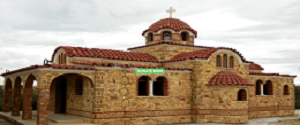By Rumy Vakarelska
Looking at the shiny window of the Conran shop in Central London, one could easily fall into the mode of wishful thinking. To all Budilnik newspaper readers, advertisers and sponsors, we wish you a very happy and prosperous 2015! It is time to mention a few of the good things that happened in 2014 and think of what is coming up next.
Recent events and economic and political prospects in the UK and across the EU, including Bulgaria, give us a good reason for caution in 2015, but if the ECB and Germany loosen the austerity grip over the Eurozone economy, which effects the UK’s and Bulgaria’s trade balance alike, 2015 might be a better year for all of us, provided we get a result in the UK’s next general elections that guarantees a balanced budget that will help reduce the UK’s multi billion debt without continuous cuts in spending on public services.
Looking further afield, today China is a progressive global power, despite the demonstrations in Hong Kong a month ago for a more open society, while the US economy is seeing growth of 5 pc per year.
George Osborne might have miscalculated next year’s growth, according to the latest figures of the Office of National Statistics (ONS), reducing the annual growth rate of the economy in the year up to the third quarter of 2014 from 3 pc to 2.6 pc.
Stephen Lewis, chief economist at ADM Investor Services International, told the Guardian on 25 December: “Sterling should remain stable as long as foreigners find the UK an attractive home for their capital, but the risks of a sharp fall in the pound would be considerable, given the extent of the current account deficit, if ever foreigners were to lose their appetite for UK investment.
“Such an adverse turn of events might come about if UK economic or political fundamentals were to weaken. But it would not necessarily take developments specific to the UK to trigger trouble. Conditions of general risk-aversion, were they to arise, could also cut the flow of investment funds to the UK, as they did in 2008,” according to Lewis.
However, net national disposable income in the third quarter of 2014 did not increase and was 5.6 pc below its pre-recession peak, according to the ONS. This explains the lower expenditure level at Christmas and the massive sales that started on the high street before Christmas.
Meanwhile, It has been a relatively good year for Bulgaria after the general elections with much smaller figures to operate with, but more positive economic developments are expected next year, following 18 months of changing governments and political instability. Namely, Bulgaria got a new GERB-led centre right coalition government, while its citizens proved that they could take down and elect new governments, although the change should not have taken such a long time. The need for a better voter registration system for Bulgarians abroad was also clearly demonstrated. In addition, much remains to be done to bring certainty and improve the workings of the Bulgarian political, social and administrative systems, as well as those that are supposed to serve Bulgarians abroad, while also raising national GDP.
Hopefully, Bulgaria will find next year new ways to make a proper stand for itself internationally rather than being still considered one of the EU’s fringe countries, and also making the life of its ordinary citizens better and easier. The solution is not necessarily in funding. It is more about accountability and the daily effort for the institutions to take part in building a more mature citizenship and society, the way the Poles and the Czechs have done, among others. Finally, to attract willing investors and more upmarket tourists by setting a high-standard system that will make Bulgarian expats and tourists have a better experience instead of a struggle to survive during their hard-earned holidays.
Some good news is that last week, Bulgaria bagged EUR 4 billion in infrastructure investment from the EU , two of the projects in energy infrastructure, with Boyko Borissov, the Bulgarian PM, and David Cameron, the British PM, shaking hands and talking about Nabucco’s extension and a new role for Bulgaria as a local gas transmission and energy hub. The country also handled well the collapse of the South Stream project.
Besides all the pre-election uncertainty, Bulgaria has also benefited from the large tranches of major international banks’ investment such as EBRD and EIB in the Western Balkans, which is set to continue in addition to private foreign direct investment, while regional gas Interconnectors and new energy projects between Romania, Greece and Bulgaria, are set to continue.
The European Council got a former Polish PM as a President, meaning that within the EU, the Eastern European countries will finally get a fair share in EU decision making.
The UK has managed to overcome the worst of the xenophobic attitudes towards the EU citizens coming to the UK, especially from Bulgaria and Romania, while Poles have advised us that this wave of negativity will go, as happened to them too. However, UK’s as economy is relatively slow and British society is going through an unprecedented transition, so anti-EU immigration campaigns are likely to continue, but there is not reason any particular nation to take this personally unless particular allegations have been made. Meeting ordinary people gives me a big hope that Britain will pass through this stage, but one has to remain vigilant as, meanwhile, the UK’s Home Secretary Theresa May has announced plans to send non-EU graduates fresh out of UK universities back home. This plan will not be productive for a number of reasons and those EU citizens, who have settled in the UK through its well working work permit system long before their countries joined the EU, will know why.
Looking at the big picture of the UK in the EU, the British government has published its final report reviewing the EU Balance of Competences. The last of 7 reports examines Britain’s relationship with the EU covering economic and monetary policy, police and criminal justice, information rights, education, vocational training and youth, EU enlargement, voting, consular and statistics and subsidiarity and proportionality. They make for exceptionally good reading especially in a general election year.
Meanwhile, Sofia has become one of UNESCO’s European capitals of cinema, while Plovdiv became a European capital of culture in 2017, the British Library and the Bulgarian National Library St. St. Cyril and Methodius started a new programme of collaboration and this trend of international cultural collaborations with Bulgaria is set to continue.
Last but not the least, the oldest Bulgarian newspaper in the UK, Budilnik, launched this English language page to inform and build bridges between Bulgaria and Britain.
Finally come people’s individual achievements to celebrate this Christmas, not forgetting that one could always count on a heart-felt blessing from the long-standing Bulgarian priest, Father Simeon, of St. Ivan Rilski Church in London, getting ready for what is yet to come!
Copyright @ Rumyana Vakarelska, Partner. Team New Europe, producing original journalistic content, editorial and public affairs consultancy. Sponsors may contact the author by email:rumy.vakarelska@gmail.com






















